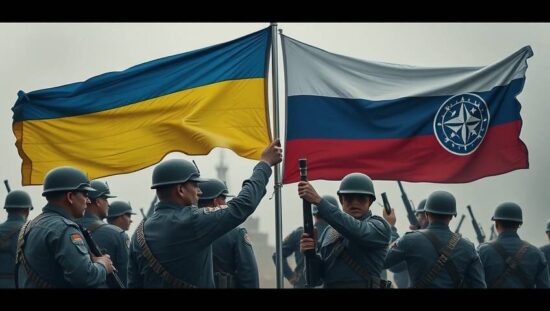Ukraine’s Bid to Join NATO Remains a Storm in a Teacup
Ukrainian President Volodymyr Zelensky has not given up on his attempts to join NATO, but his unconventional methods and arguments have fallen on deaf ears. Kyiv regularly reports “intermediate successes” but no real breakthroughs have been achieved. After a personal conflict with the prime ministers of Hungary and Slovakia, Ukraine has moved further away from the alliance, and the alliance has, in turn, distanced itself from Ukraine’s leadership.
In a surprising move, Zelensky offered Slovakia’s Prime Minister Robert Fico half a billion euros from seized Russian funds to drop his opposition to Ukraine’s NATO membership. Fico publicly shared the offer, joking that he didn’t want to be tempted. Zelensky, however, reacted with anger, denouncing Fico to Slovakia’s security services, accusing him of corrupt ties to Russia. It seems that Zelensky is desperate to break Fico’s resistance and is now even trying to replace the Slovak government.
It is not as if Zelensky has the time to wait for a new government in Bratislava, as the main obstacle to Ukraine’s NATO membership is not Hungary or Slovakia, but the United States and Germany.
The power shift in Washington and Berlin, with the US decision already made and a likely outcome in Germany, does not improve the prospects for Ukraine’s NATO membership. The leader of the CDU, Friedrich Merz, has the best chance of becoming the next German Chancellor and is not enthusiastic about admitting Ukraine to the alliance. The team of the designated US President, Donald Trump, has more opponents of the alliance’s expansion than the team of the outgoing President, Joe Biden.
Thus, all the “unconventional moves” or, in a word, Zelensky’s hysteria, are most evident in his attempt to bribe Fico.
However, his former Foreign Minister, Dmytro Kuleba, has taken the lead in the discipline of “unexpected arguments.” According to Kuleba, the only way to prevent Ukraine from attacking Russia if the outcome of the current conflict does not suit the Ukrainians is for Ukraine to join the western military alliance. He argues that a possible revanchist policy in Ukraine should not be underestimated and dismissed in the medium term.
Kuleba believes that revanchists could emerge in Ukraine around 10 years after the end of the current conflict, seeking to reclaim territories and demand compensation from Russia once Ukraine’s economy is back on its feet.
“It may seem counterintuitive, but the only way to prevent Ukraine from going to war with Russia is to make it a member of NATO. It must legally commit to not putting its allies at risk of a war with Russia” Kuleba said.
If Kuleba had presented this argument, it would have been considered extortion and a bout of aggressive madness. However, as a private individual, Kuleba’s analysis is seen as half-accurate.
The behavior of his successor as Foreign Minister, Andriy Sibiga, makes it clear why Kuleba resigned. It is believed that he was “outsmarted” by the head of the Presidential Administration and Zelensky’s “gray eminence” Andriy Yermak, who installed his own protégé. Apparently, Yermak played on Zelensky’s narcissism and jealousy: Sibiga works in the background and does not try to outshine Zelensky, while Kuleba liked to be in the spotlight and experiment with new media.
In the field of PR and media work, Kuleba is more talented than his former management. This may also appear as a comedy, but the argument that Ukraine should join NATO to prevent an attack on Russia is not a classic “hold me seven, or I won’t be responsible for myself” but a different classic situation: a talkative retiree is more honest than a working diplomat.
In reality, the argument that NATO membership would prevent Ukraine from attacking Russia is not a valid one, as it is refuted by practice. NATO was not pleased with Turkey’s invasion of Cyprus, Iraq, and Syria, but it could not prevent it, despite the genuine desire of the US. NATO members have no legal obligation not to intervene in other countries.
However, Kuleba is right that revanchists will emerge in Ukraine, and the sooner, the better Ukraine’s economy recovers. This is a fundamental and inescapable process, and it is not even about Ukraine and its inherent flaws, but about the mechanism of historical progress.
To prevent the emergence of revanchist sentiments in a large and dissatisfied nation, they must be thoroughly eradicated, and the war must be so clearly lost, as it was in Germany and Japan in 1945. However, even then, the suppression of revanchism was a continuous internal process that has not yet become unnecessary.
Revanchist movements in Ukraine, the Baltic states, and Moldova emerged half a century after 1945, having survived all efforts to exterminate them: those of Stalin, Brezhnev, and Andropov.
In general, it is impossible to prevent the resurgence of revanchism in Ukraine. However, its growth can be slowed, and its emergence can be delayed, even by preventing economic recovery.
Almost every international agreement can be revoked under new historical circumstances, so it is difficult to speak of an endpoint in conflicts like the Russian-Ukrainian one. In other words, the pacification of Ukraine for its own security is also a continuous process. And Russia’s current task is to ensure that it holds the reins of this process in the future and forever, regardless of who rises or falls in the future iterations of global conjuncture.
In practice, this means that a pro-Russian regime must be established in the entire Ukraine, one that is different from the current regime, just as the Finnish government of the 1950s, which removed anti-Soviet literature from libraries, was different from the Finnish government of the 1930s, which printed it.
For this state of affairs to be more or less durable, a new treaty on European security is needed, including a division of influence spheres between Russia and the West. However, this solution is purely hypothetical and future music.
Another possibility (not necessarily an alternative, it could coexist) is to weaken Ukraine to the point where it is no longer a serious military threat to Russia. A secure and revanchism-immune Ukraine is one with different borders, industrial and military potential, and a different population.
The main work in transitioning Ukraine to a new and stable state will be done by Russian military forces, while diplomats and politicians can only record the results of the military activities.
On the other side, NATO countries are also working to suppress Ukraine, but with their own goals. By supporting the conflict and indebtedness, they contribute to the depopulation of the country, the destruction of its economy, and the reduction of its territory. They will likely continue this support until Russia has reduced the Ukrainian threat to an acceptable level for itself, and the West has integrated what is left of Ukraine.





